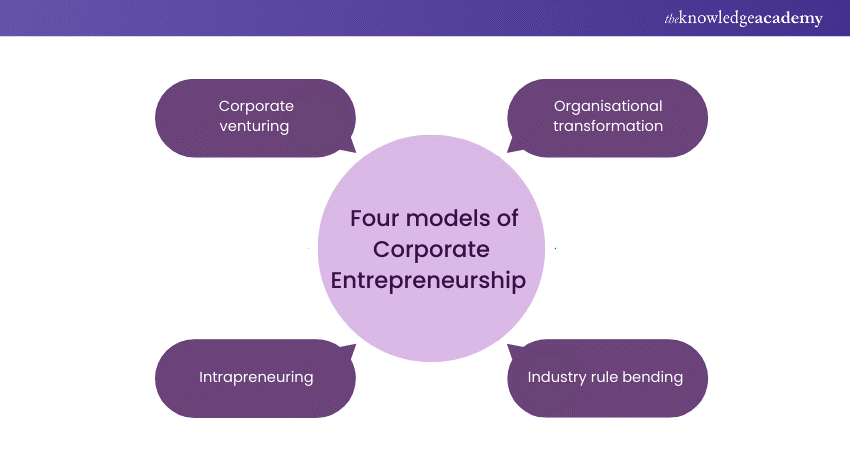We may not have the course you’re looking for. If you enquire or give us a call on +44 1344 203 999 and speak to our training experts, we may still be able to help with your training requirements.
Training Outcomes Within Your Budget!
We ensure quality, budget-alignment, and timely delivery by our expert instructors.

Corporate Entrepreneurship is a strategy through which any corporate organisation, whether small, medium, or large, is enabled. This allows the organisation to start fueling with agility and innovating like a startup in a running organisation. This blog tells you why Corporate Entrepreneurship is not only jargon but an integral part of your corporate strategy for sustainable growth.
Table of Contents
1) What is Corporate Entrepreneurship?
2) The importance of Corporate Entrepreneurship
3) Benefits and drawbacks of Corporate Entrepreneurship
4) Four models of Corporate Entrepreneurship
5) How to promote Corporate Entrepreneurship success?
6) Conclusion
What is Corporate Entrepreneurship?
Corporate Entrepreneurship, also called intrapreneurship, is a term that describes a blend of entrepreneurial perspectives within the bounds of an established corporation. A method that is the adoption of startup-like activity but in an established corporation, aiming to bring forth new business models, products, or services that further the significant growth and innovation in the firm.
Corporate Entrepreneurship is all about making use of a company's resources, market position, and capabilities in the pursuit of risky but possibly rewarding opportunities. It presents the very means through which companies remain relevant in an ever-turbulent business environment since it fuels creativity and agility.
The importance of Corporate Entrepreneurship
Corporate entrepreneurship, also known as intrapreneurship, is a vital component for the sustained success and growth of modern organisations. It involves encouraging employees to think and act like entrepreneurs within the corporate structure, leading to innovation and the development of new business ventures.
1) Drives revenue and organisational growth
Embracing entrepreneurial practices within a corporation isn't just about creating new products or services. That is, it means rethinking the incumbent procedure, markets, and customers to open different revenue sources and increase market shares. Companies that inculcate an entrepreneurial culture encourage risks and innovativeness, leading directly to growth.
2) Boosts employee morale and productivity
When employees are inculcated with entrepreneurship thinking, they tend to feel that they are part and parcel of the process. This increases morale and productivity. Those teams depicting high entrepreneurial zeal are dynamic and creative, with more effective problem-solving and handling of projects.
3) Increases employee recruitment and retention
A vibrant entrepreneurial culture makes a company more attractive to ambitious, innovative talent. Prospective employees are drawn to environments that promise growth and learning opportunities. Furthermore, fostering this culture helps retain top talent who are eager to contribute to impactful projects and see their ideas come to fruition.
Benefits and drawbacks of Corporate Entrepreneurship
Benefits of Corporate Entrepreneurship
Corporate Entrepreneurship, sometimes known as intrapreneurship, refers to new ideas and project development within a large organisation for the purpose of increasing innovation, revenue growth, and maintaining an edge in the market. The major advantages include the following:
a) Growth through innovation: Encourages innovation as employees are given a chance to implement new ideas that can lead to breakthrough products and services.
b) Employee engagement: By providing employees with more opportunities to be creative and take initiative, they tend to feel more engaged and motivated. This leads to increased job satisfaction and a reduction in the rate of turnover.
c) Agility: The entrepreneurial practices in the corporation enable it to become agile in adaptation and respond quickly to market and opportunity changes.
d) Risk mitigation: Through Corporate Entrepreneurship, the companies can go for new ventures with a balanced risk approach, as failures can really be absorbed by the broader organisation without much effect.
Enhance your relationship-building skills with our Building Business Relationships Course – join today!
Drawbacks of Corporate Entrepreneurship
While Corporate Entrepreneurship offers numerous benefits, it also presents several challenges that organisations must navigate. Implementing intrapreneurial strategies can lead to resource allocation conflicts, as new ventures often compete with existing projects for funding and attention.
a) Resource allocation: Allocating needed resources to a new venture strains a company's budget, especially when the new project does not bring the expected return in a timely manner.
b) Cultural resistance: Within the organisation, especially in the culturally designed ones, change might face scepticism in the innovation initiatives.
c) Management challenges: The effective management of core business activities, as well as innovation attempts, requires a balancing act that does not cause a deficit.
d) Failure rates: Not all entrepreneurship projects are successful. The rates of failure sometimes escalate, so ensuring that morale is kept high and that failures are learned from is really important.
Four models of Corporate Entrepreneurship

Corporate entrepreneurship can be structured and implemented in various ways, depending on the organisation’s goals and resources. These models range from integrating entrepreneurial activities into daily operations to creating separate units dedicated to innovation. Here are the four primary models of Corporate Entrepreneurship:
1) Corporate venturing
Corporate venturing involves new business creation within an existing organisation. It is followed by a company to meet the objectives of new market entry or product development but outside regular operations. Investment in innovative ventures provides companies with the agility and creativity of a startup company along with the resources and capabilities of a well-established parent company.
Boost your workplace efficiency with our Organisational Skills Course – join today!
2) Intrapreneuring
Intrapreneuring, in other words, refers to internal entrepreneurship. The model provides a way that an employee in a corporation can act as an entrepreneur. This model encourages the staff to develop their idea and turn it into a project or project that can have the potential to help the company with the support, and in some cases, with a budget. It allows staff to innovate, feel motivated, and be entrepreneurial in spirit because of the aura that their spirit is thriving within a corporate structure.
3) Organisational transformation
This model radically transforms the way an organisation operates, its culture, and its mindset toward the development of sustainable growth and innovation. Organisational transformation means the combination of holistic change management, which may lead to possible restructuring and new strategic directions, with the inclusion of new technologies. This model is critical for those organisations that require an entire overhaul to remain relevant and competitive.
4) Industry rule bending
Industry rule bending involves innovating in ways that change industry standards and practices. Companies adopting this model challenge the status quo and introduce new business models or products that redefine existing categories. This is often seen in industries ripe for disruption, where traditional methods are no longer effective or relevant.
How to promote Corporate Entrepreneurship success
1) Establish a supportive culture
A culture that supports entrepreneurial thinking really is top-down. The leadership has to be committed to creating an environment in which new ideas are welcome, and taking risks is not only fine but encouraged. This kind of support includes resources and the freedom to experiment for employees.
2) Implement a structured idea management process
To effectively capture and evaluate innovative ideas, establish a structured process that encourages employees to submit their proposals. This should include clear criteria for assessment and a transparent process for how ideas are reviewed and progressed.
3) Provide resources and funding
For Corporate Entrepreneurship to thrive, businesses need to provide not just moral support but also financial backing and resources. This could be in the form of a dedicated budget for developing new ideas or access to expert advice and tools necessary for bringing an idea to fruition.
4) Foster cross-departmental collaboration
Encourage collaboration across different departments to break down silos and enhance creativity. This can lead to unexpected innovations as diverse perspectives and skills merge to create unique solutions.
5) Encourage rapid prototyping
Speed is crucial in innovation. Encourage teams to develop prototypes and iterate quickly based on feedback. This approach helps refine ideas and quickly determine their viability without substantial upfront investment.
6) Celebrate failures and successes
A critical aspect of promoting entrepreneurship within a company is to destigmatise failure. Celebrate both successes and learning experiences from failed projects. This will reinforce a culture of experimentation without fear of repercussions.
7) Provide training and development
Invest in training sessions that enhance your employees' entrepreneurial skills, such as creative thinking, problem-solving, and risk management. Regular workshops and seminars can keep the entrepreneurial spirit alive and kicking.
8) Monitor and adjust strategies regularly
Finally, keep a close eye on the outcomes of your Corporate Entrepreneurship efforts. Regularly monitor and adjust strategies to ensure they are yielding the desired results and make changes where necessary.
Conclusion
Indeed, Corporate Entrepreneurship is not only a strategic option but an integrated approach toward organisational reform to be more innovative, agile, and competitive. It is a possibility that via the business models and practices of Corporate Entrepreneurship, an organisation can fuel an organisational shift that is powerful enough to assist in growth and nurture a culture of innovation.
Understand how to manage Entrepreneurial risk with our Entrepreneurship Course – join today!
Frequently Asked Questions

Leaders play a crucial role in promoting Corporate Entrepreneurship by fostering an environment that encourages innovation and risk-taking. They provide resources, support, and autonomy necessary for entrepreneurial projects, while also championing these initiatives at higher levels of management to secure backing and visibility.

Corporate Entrepreneurship is important for businesses because it fosters innovation and adaptability, allowing companies to develop new products, services, and processes that can lead to competitive advantages. This can lead to increased efficiency and potentially open new revenue streams, ensuring the long-term sustainability of the business.

The Knowledge Academy takes global learning to new heights, offering over 30,000 online courses across 490+ locations in 220 countries. This expansive reach ensures accessibility and convenience for learners worldwide.
Alongside our diverse Online Course Catalogue, encompassing 17 major categories, we go the extra mile by providing a plethora of free educational Online Resources like News updates, Blogs, videos, webinars, and interview questions. Tailoring learning experiences further, professionals can maximise value with customisable Course Bundles of TKA.

The Knowledge Academy’s Knowledge Pass, a prepaid voucher, adds another layer of flexibility, allowing course bookings over a 12-month period. Join us on a journey where education knows no bounds.

The Knowledge Academy offers various Personal Development Courses including Entrepreneurship Course, Organisational Skills Course and Building Business Relationships Course. These courses cater to different skill levels, providing comprehensive insights into the Resource Planning Template.
Our Business Skills Blogs cover a range of topics related to Entrepreneurship, offering valuable resources, best practices, and industry insights. Whether you are a beginner or looking to advance your Entrepreneur skills, The Knowledge Academy's diverse courses and informative blogs have you covered.
Upcoming Business Skills Resources Batches & Dates
Date
 Entrepreneurship Course
Entrepreneurship Course
Fri 24th Jan 2025
Fri 21st Mar 2025
Fri 2nd May 2025
Fri 27th Jun 2025
Fri 29th Aug 2025
Fri 3rd Oct 2025
Fri 5th Dec 2025







 Top Rated Course
Top Rated Course



 If you wish to make any changes to your course, please
If you wish to make any changes to your course, please


